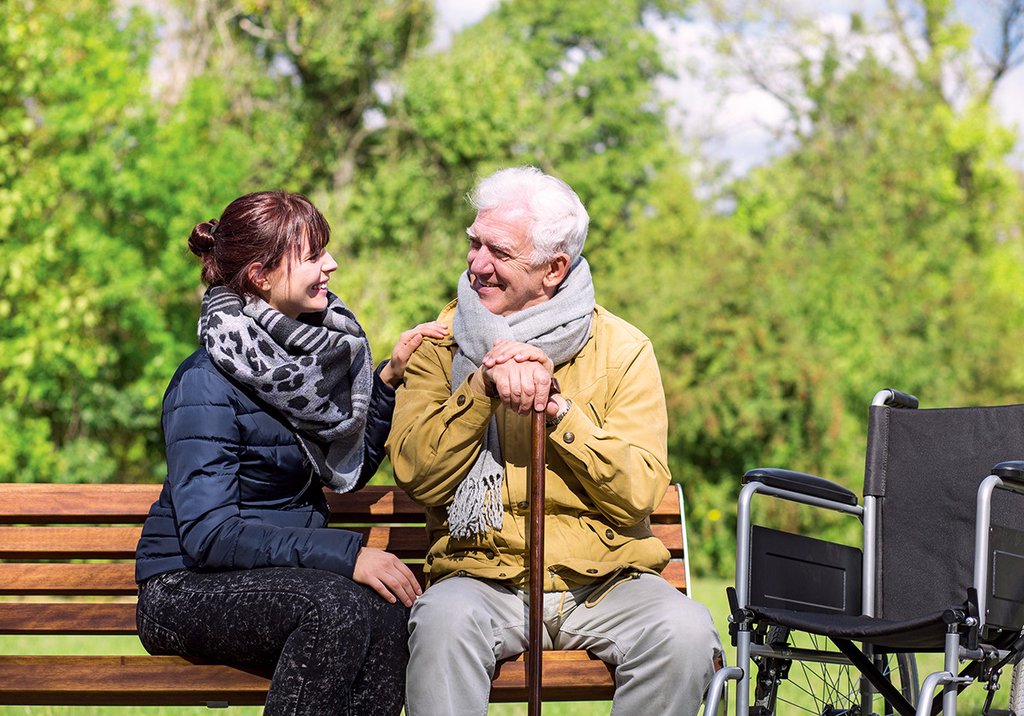If you don’t take care of yourself, you’ll end up being unable to take care of the one who needs you
By Wendy Haaf
When Carole Ann Alloway’s then-64-year-old husband, Bill, went into hospital for ankle-replacement surgery seven years ago, she expected to take over his household chores for the three months it would take him to recover. Instead, as Bill developed one unexplained infection after another—requiring multiple courses of IV antibiotics and several subsequent operations to remove and replace the implant—Carole Ann, then 59, found herself not only shouldering all of the tasks the Toronto couple had once tackled as a team, but also performing the duties of a personal support worker and nurse.
When she wasn’t arranging doctors’ appointments, managing medications, or helping her much-larger spouse—Carole Ann is five foot one; Bill, six foot ten—bathe, dress, or get in and out of bed, Carole Ann watched over every step of his wound care. She also spent countless hours on the computer, learning everything she could about Bill’s health problems (which grew to include an irregular heart rhythm and heart failure) and trying to figure out why he kept getting sick.
“Around the third year, I knew I was in trouble because I was either angry or crying all the time,” she recalls. “And I hid it from my best friend—my husband—because he felt bad enough as it was and my problems were small compared to what he was going through.”
Carole Ann didn’t know there was a name for the unpaid labour-of-love job she was doing. “With all the research I did, I never looked up caregiving because I didn’t even know that word. I just thought I was a wife looking after my husband.”
It wasn’t until nearly five years after Bill’s first operation that Carole Ann came across the term “caregiver” in a story in The Globe and Mail, written by a woman whose husband had been diagnosed with a brain tumour.
“Everything she wrote about the isolation, being overwhelmed, feeling guilty about feeling sorry for herself, having her life change without having asked for it, and now having to devote her life to caring for her husband struck a chord,” Carole Ann says. “I just handed the article to Bill and said, ‘This woman has just written about my life.’”
THE TOLL TAKEN
Every year, many Canadians find themselves in Carole Ann Alloway’s shoes. According to the Statistics Canada report “Family Caregivers: What Consequences?”, in 2012, eight million of us were providing unpaid care for a friend or family member—that’s nearly one in three. Of those informal caregivers, 20 per cent were aged 55 to 64 and 12 per cent, 65 or older.
Like Alloway, a growing number find themselves struggling psychologically and emotionally as a result: as research from Health Quality Ontario revealed, “Among the 97 per cent of long-stay home-care patients who also received care from an unpaid caregiver in 2013–14, one-third had caregivers who experienced distress, anger, or depression in relation to their caregiver role or were unable to continue.”
At more than double the rate reported in 2009–10, this increase is due, at least in part, to higher proportions of care recipients having cognitive impairments or dementia, difficulty carrying out everyday tasks, and unstable health conditions—all characteristics associated with a greater likelihood of caregiver distress. Other factors linked with a boost in the odds include providing care for someone with multiple chronic conditions, caring for a spouse, living under the same roof as the care recipient, and perceiving the patient to be suffering.
“We know, for example, that the prevalence of depression is very high among people with multiple chronic conditions, and from our research, we know that if someone is depressed, the caregiver is three times more likely to have depression themselves,” notes Maureen Markle-Reid, an associate professor at McMaster University’s School of Nursing and a scientific director at the Aging, Community and Health Research Unit, in Hamilton, ON.
As if all of that weren’t bad enough, there’s also a good deal of evidence that the stress of caring for a loved one can have serious consequences for a caregiver’s physical health.
Many studies have found that caregivers are more likely than non-caregivers to suffer from a host of health problems ranging from impaired immune function to headaches, high blood pressure, and diabetes; in fact, in 2012, one in three people who cared for a spouse (and 18 per cent of those caring for a parent) reported having sustained an injury or having seen a medical professional for health problems resulting from carrying out their tasks.
In one 2003 study that tracked more than 54,000 female caregivers aged 46 to 71 with no previous history of coronary heart disease, stroke, or cancer, those who provided nine or more hours of care to a spouse had twice the incidence of non-fatal heart attacks or death from coronary heart disease over a four-year follow-up than did women who were free of such obligations. (Interestingly, caring for a parent or anyone other than a spouse with an illness or disability wasn’t linked with an increase in incidence.) In 2012, Canadian spousal caregivers provided an average of 14 hours of care a week.
For older people caring for a spouse, caregiver stress seems to substantially increase the chances of dying prematurely. A study published in 1999, which involved 392 spousal caregivers and 427 non-caregiver spouses aged 66 to 96, found that those who reported experiencing stress related to their caregiver role had a 63 per cent higher incidence of premature death over the study’s four-year follow-up period than did spouses who didn’t provide care.
The picture isn’t entirely bleak, however. Providing care for a loved one can be very rewarding, helping to build new skills, leading to a sense of accomplishment, and offering an opportunity to deepen relationships. And there are ways to prevent or at least diminish some of the stress, and the consequent distress, that can come with caregiving.
GET INFO EARLY
When Bill Alloway was released from hospital with a metal cage screwed around his ankle, no one asked Carole Ann how she was going to be able to help him get in and out of bed or the bath. Angus Campbell, now executive director of the Caregivers Nova Scotia association, had a similar experience when his late partner, Paul, whose lower body had become paralyzed due to complications from AIDS, came home to their three-storey flat following a nine-month hospital stay.
“There was nobody to teach me how to do these types of transfers. I learned how to do them on the job and could easily have hurt my back,” Campbell says. “I was told I needed a trapeze, but nobody offered me any resources on how to get one or even what a trapeze looked like, let alone how to use it. So I had to do a lot of research on my own.”
This kind of digging can eat up a substantial amount of time. One caregiver consulted for the Health Quality Ontario report “The Reality of Caring: Distress among caregivers of home care patients” told of spending an estimated 20 hours a week simply trying to find such information. Worse yet, some caregivers are so overwhelmed by other responsibilities that they haven’t the mental energy to spare.
What Campbell didn’t know then is that there are organizations, including the one he works for today, that could have substantially shortened that process.
“Our health-care system is very big,” he says, and even health-care professionals may not know where to go to get specific kinds of help. “If people call us, we can help them navigate the system and connect them with resources.” (You can find a list of provincial caregiving organizations by visiting carerscanada.ca and clicking on “Partners” in the left-side menu.)
Groups focused on specific diseases or conditions, such as the MS Society of Canada and Parkinson Canada, can also supply this type of information, as well as a wealth of material about the health problem in question. For example, the not-for-profit organization Alzheimer Society of Canada provides education about what to expect as the condition progresses, from the person becoming agitated in certain situations to him or her wandering off or getting lost. (The Society is also a go-to resource for other types of dementia, including the variety that can occur after a series of strokes.)
“Knowing what’s coming will enable you to get some strategies in place to avoid many crises and to deal with the ones that come, and also to know whom to turn to for help,” explains Mary Schulz, director of education at the Alzheimer Society of Canada. “The research is very clear that family caregivers of someone with dementia who know what’s going to happen in the typical course of the disease do much better in the long run than caregivers who don’t have that information.”
Being able to plan ahead seems to be key to maintaining one’s emotional health and avoiding burnout, says Janice Keefe, director of the Nova Scotia Centre on Aging at Mount Saint Vincent University in Halifax.
DON’T FLY SOLO

Photo: iStock/Squaredpixels.
Letting go very early in the process of the idea that you alone must, or can, shoulder the burden of caregiving is another necessity in protecting your emotional and psychological health.
“The healthy caregiver, the caregiver who’s going to be able to go the distance, is the one who says he or she needs help early on,” Schulz stresses.
It’s worth keeping in mind that nearly everyone with Alzheimer’s disease or other dementias will eventually require transfer to long-term care and that doesn’t mean you’ve failed; it simply reflects the pervasive effects of these diseases, Schulz says. She notes, however, that research out of New York indicates that when family caregivers of people with dementia receive appropriate information and support, “they can often delay a move to a nursing home by as much as a year and a half.”
Agencies such as the Alzheimer Society and provincial caregivers’ associations can help you find out what kinds of publicly-funded practical help you’re entitled to, what kinds of financial programs are available at various levels of government, and what kinds of services are offered in your community (and what they cost). If you’re fortunate enough to have family members living nearby who are open to pitching in, sit down together. “See if you can get on the same page as to who wants to do what or who’s willing to do what,” advises Rick Lauber, author of Caregiver’s Guide for Canadians (Self-Counsel Press, 2014), “because not everybody is willing or able to do all the jobs required.”
If Carole Ann Alloway could do things over in caring for her husband, she says, “I would have asked my kids for help. They believe me to be a very strong person, and I thought they would think differently or poorly of me because I couldn’t handle it. So I didn’t ask. They had no idea.”
Instead of demurring when friends said, “Let me know if you need anything,” Alloway says she would in retrospect “keep a list of things that needed doing, and if somebody offered, say, ‘Here’s what you can do.’ For instance, walking my dog—some days, that gave me a chance to get out, but other days, I had so much to do that it was just one more chore and I resented it.
“I think I would be a much better friend for someone who is a caregiver now, having been through it, knowing what I could have used.”
TAKE REGULAR BREAKS
Regular breaks from caregiving are at least as important as getting practical hands-on assistance.
Sharon Roszel of Toronto cared for her mother, who had dementia, at home for 10 years while working full-time. A weekend respite program allowed Roszel to get two days a week to herself, along with two nights of sleep without having to keep one ear cocked, when her mother’s dementia progressed to the point that she couldn’t be left alone.
“That was a huge help,” Roszel says, “because you do get stressed out and frustrated, and you need time away.”
“Caregiver respite—taking a break—is probably the most important thing for a caregiver,” Lauber says. “Just like you need to fuel up a car every now and again to make it run, you need to give yourself fuel so you can keep running at peak performance.” After all, if you break down or run out of gas, who’s going to step in?
“If you don’t care for yourself, you can’t care for your loved one,” stresses Dr. Joshua Tepper, president and CEO of Health Quality Ontario.
Alloway wishes she’d learned that lesson much earlier. It wasn’t until three years in that she finally gave in and hired a cleaning service.
“When you first start out, you think, Oh yeah, I can look after this; it’s no big deal,” she says. Over time, however, “you’re like a hamster on a wheel: you’re just trying to get through the next thing—then everything will be fine. But there’s always a next thing.”
PRACTISE SELF-CARE
Getting practical help and taking regular breaks are just two aspects of a larger caregiver survival skill: self-care. Exercise, for example, not only helps keep you in good physical health, but it can help ease stress and improve sleep quality. Hobbies and other pursuits can provide a mental break.
“Go shopping. Go to a movie. Meet a friend for coffee. Curl up with a book,” Lauber advises. “Do something you like doing. I chose writing, which was a very effective means of managing and coping and venting. Some of my stories were published and ultimately became the platform for my books; others remain saved forever on the computer desktop.”
Alzheimer Society of Canada’s Mary Schulz notes that it can be difficult for spousal caregivers of people with dementia, in particular, to contemplate doing an activity alone that they once enjoyed as a couple. “It’s about realizing that you need to start bridging your life with your partner to your life without your partner and preparing for a day when he or she will no longer be living with you,” Schulz explains. This can evoke grief that feels premature because the loved one is still here. “People say, ‘I sound like I’m wishing he would die when I’m planning for the day he’s no longer here,’ but that doesn’t make it so—you’re powerful, but you’re not that powerful.”
MAINTAIN SOCIAL CONNECTIONS
Time with friends, volunteering, and other social activities are other common casualties of caregiving, “and we know that there’s a strong relationship between social participation, social engagement, and your physical and mental health,” says Janet Fast, professor and co-director of research on aging, policies, and practice at the University of Alberta in Edmonton.
When Fast and her colleagues used data from Statistics Canada’s 2007 “General Social Survey Report” to examine the social consequences of caregiving, they found that nearly two-thirds of those caring for a spouse or partner spent less time on social activities.
“Your friends kind of drift away,” Carole Ann Alloway says. “People didn’t keep in touch, or if they did, they’d just want to talk to Bill. I think I stopped answering the phone in Year Two because it was never for me anymore; it was always someone calling to ask how Bill was. In the whole five years, the only person who asked me how I was doing was our pharmacist—when I handed her a prescription for an antidepressant.”
Given the chance for a do-over, Alloway says, “I certainly would make a point of staying in touch with friends.”
CONNECT WITH OTHER CAREGIVERS

“You never know what you’ll find once you start talking,” Rick Lauber says. “Someone might say, ‘Oh, I just went through that with my mother and here’s what we tried; it might work for you.’”
It wasn’t until Alloway felt moved to contact the author of the article in The Globe and Mail that she made such a connection.
“I think getting together with other caregivers is key,” she says. “I’m not a joiner—I don’t belong to any clubs—but I love talking to other caregivers. Basically, it just helps to know that you’re not alone, that you’re not crazy for being frustrated and angry.”
Carole Ann Alloway’s caregiving days came to an end after a specialist finally pinpointed the cause of her husband Bill’s recurrent infections, paving the way to his ultimate recovery. (The underlying problem turned out to be a plate and screws that had been used to repair a broken ankle 30 years earlier and left in place. After two more surgeries—one to remove the offending hardware and another to fuse the ankle—Bill eventually got back on his feet and is now doing well.)
Carole Ann had some recovery to do, too, and as part of her healing process, she co-founded a group aimed at educating caregivers about how to advocate for themselves, called Family Caregivers Voice (familycaregiversvoice.ca).
Photo: iStock/Monkeybusinessimages.
“Ultimately, I was happy to take care of my husband,” she says. But she—along with Caregivers Nova Scotia’s Angus Campbell, who saw his late partner Paul through the final 15 months of his life—would have surely benefited from the kind of upfront knowledge and support that they both now work to help promote. Because, as Campbell movingly explains, the ultimate point is to be able to offer your loved one the best care possible.
“It was challenging, but absolutely worth it,” he says. “I would gladly do it again.”
Photos: iStock/Katarzyna Bialasiewicz.





